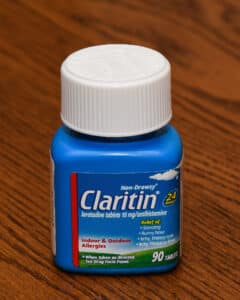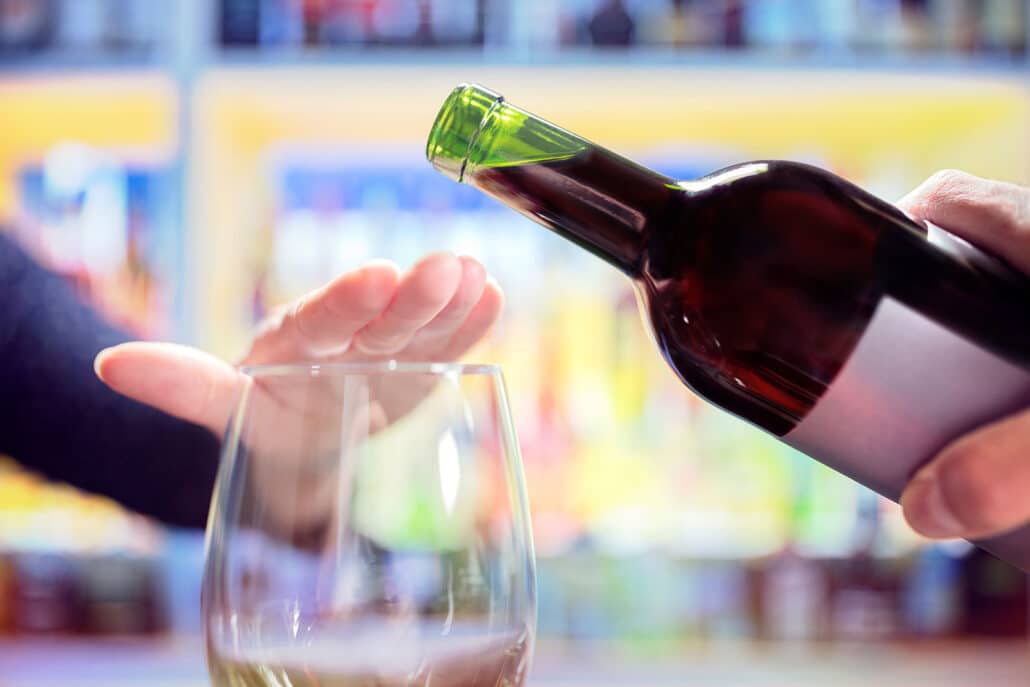Medical treatments have come a long way this past decade, and treating seasonal allergies has become as simple as taking a Claritin pill. This medication has shown impressive results in blocking the allergens causing the inconvenient symptoms.
As effective as it is, you should avoid mixing Claritin with other sedative substances, especially alcohol, as it could cause a dangerous interaction. If you want to know more about the risks of an alcohol-Claritin combination, this post covers everything you need to know.
Table of Contents
- 1 What Is Claritin?
- 2 How Does Alcohol Affect Your Body?
- 3 Is It Safe to Mix Alcohol and Claritin?
- 4 How to Take Claritin With Alcohol?
- 5 What If You Have an Alcohol Abuse Issue?
- 6 What Other Substances Does Claritin Interact With?
- 7 Why Would People Combine Claritin and Alcohol?
- 8 How Do First-Generation Antihistamines Interact With Alcohol?
- 9 Final Thoughts
What Is Claritin?

Claritin is an over-the-counter medication used to treat allergy symptoms, such as runny nose, watery eyes, itchy throat, and sneezing.
When you inhale pollen or dust, your immune system identifies these allergens as a threat. So, it prompts the release of chemicals called histamines to prevent them from spreading.
These chemicals trigger the allergy symptoms mentioned above. However, Claritin blocks histamines from attaching to your histamine receptors, stopping the allergy symptoms from occurring in the first place.
Claritin is labeled as a second-generation antihistamine. That means it has a longer-lasting effect and prompts less severe side effects than a first-generation variant, like Benadryl.
Note that this medication affects each patient differently, depending on their physical well-being. That said, the common side effects of Claritin include:
- Drowsiness and sleepiness
- Insomnia
- Difficulty breathing
- Headache
- Dry mouth
- Gastrointestinal distress
- Blurry vision
- Heart palpitations
- Fatigue
- Constipation
- Rapid heartbeats
- Sore throat
- Anxiety or nervousness
- Nosebleed
How Does Alcohol Affect Your Body?
Although alcohol has a stimulating effect, it’s actually a depressant that slows down brain activity. It disrupts the neurotransmitters responsible for transferring information between neurons.
That can prompt behavioral and psychological changes, but these changes differ from one person to another, depending on the longevity and intensity of the alcohol consumption.
Short-term side effects of alcohol consumption include:
- Relaxation
- Drowsiness
- Loss of consciousness
- Memory blackouts
- Nausea and vomiting
- Mood swings
- Concentrating issues
- Difficulties in making decisions
- Lowered inhibitions
- Lack of coordination
- Slurred speech
- Head pain
- Impulsive behavior
- Diarrhea
People who consume alcohol don’t necessarily experience all these effects simultaneously. Some of them take effect quickly, while others take a few hours.
Long-term alcohol consumption can prompt more intense symptoms than drowsiness and nausea. These include:
- Insomnia
- Anxiety
- A weakened immune system
- Restlessness
- Mood swings
- High blood pressure
- Cardiovascular diseases
- Liver disease/inflammation
- Long-term cognitive decline
- Changes in appetite
- Pancreatitis
- Lowered libido
Is It Safe to Mix Alcohol and Claritin?
Both Claritin and alcohol are central nervous system depressants. So, mixing them together can slow down your nervous system activity.

Although a second-generation antihistamine like Claritin won’t necessarily prompt serious side effects from this interaction, it’s still not safe to take it with alcohol. You may experience the following side effects.
1. Extreme Dizziness
Since both substances lower your heart rate, your heart won’t pump enough oxygen-rich blood to the rest of your body. So, you’ll experience fatigue, lightheadedness, and difficulty controlling your movements.
2. Liver Damage
As previously established, alcohol can prompt liver damage, as each time you consume alcohol, some of your liver cells die.
Loratadine, the active ingredient in Claritin, has also been associated with acute liver injury. So, combining both substances can cause liver disease or toxicity.
3. Overdosing
When you take Claritin and drink alcoholic beverages back to back, your liver will take longer to filter and metabolize these sedative substances. So, this excessive dose will stay in your system for longer, increasing the risk of an overdose.
If you think you’re experiencing an alcohol-Claritin overdose, don’t hesitate to contact us immediately.
4. Compromised Claritin Effectiveness
Alcohol can affect the way your body absorbs and breaks down other medications, including Claritin, making it less effective at alleviating allergic reactions.
Besides, alcohol can prompt a histamine reaction, which dilates your blood vessels, causing nasal congestion and a runny nose. That means it can counteract the effect of Claritin, preventing it from treating your allergy symptoms.
5. Learning Impairment
Claritin disrupts your ability to learn by suppressing the activity of acetylcholine, a neurotransmitter that’s responsible for your memory, attention, and overall learning ability.
Alcohol has a similar influence. It targets the central nervous system, disrupting your concentration and memory. These two substances combined can cause learning impairment.
6. Amplified Side Effects
Both alcohol and Claritin have their own risks and side effects. When you combine them together, you risk amplifying these side effects to an extreme degree.
These amplifications include cognitive impairment, lack of coordination, hives, itching, swelling, and more.
It’s worth noting that people react to the alcohol-Claritin combination differently, depending on their age, sex, metabolism, and overall health. So, not everyone will experience the mentioned symptoms.
For example, women and older men may experience more intense side effects, especially if they have any diabetes or heart/liver/kidney diseases.
How to Take Claritin With Alcohol?
Since you should avoid mixing alcohol and Claritin, wait for your body to process one substance before you take the other. On average, your body takes around one hour to process one alcoholic beverage.
So, keep track of time when you drink alcohol before Claritin and monitor how your body reacts after the medication. If you feel drowsiness or sedation, avoid doing tasks that require concentration, such as driving or doing construction work.
As for Claritin, it usually takes around 24 hours to leave your system. That’s when it’s safe to drink alcohol. You should still consult a healthcare provider about the proper time between each intake.
Ultimately, the safest way to take Claritin without experiencing severe side effects is to refrain from drinking alcohol altogether while taking the medication.
What If You Have an Alcohol Abuse Issue?
People struggling with alcohol abuse can find it difficult to wait long enough between taking the medication and consuming alcohol. That’s why they should tell their doctors about that issue so they adjust the treatment plan accordingly.
Since many of the allergy medications on the market can interact with alcohol, they might adopt a natural approach, such as nasal washes or saline sprays.
What Other Substances Does Claritin Interact With?
Alcohol isn’t the only substance that Claritin interacts with. It can prompt dangerous side effects if you combine it with other medications as well.
That’s why you should tell your doctor all the medications you take before they prescribe Claritin to avoid potential health complications. The interactive medications include:
- Amiodarone (Pacerone)
- Ritonavir (Norvir)
- Erythromycin (Erygel)
- Carbamazepine (Tegretol)
- Rifampin (Rifadin)
- Cimetidine (Tagamet)
- Midodrine (ProAmatine)
Why Would People Combine Claritin and Alcohol?
Understanding the risks of mixing Claritin and alcohol, you might wonder why anyone would combine those two substances. Here are the common reasons:
Not Understanding the Risks
Not everyone knows that alcohol and Claritin can prompt a dangerous interaction. Those people have no reason to leave enough time between taking Claritin and drinking alcohol.
Besides, Claritin bottles don’t warn people against taking the medication with alcohol. So, the only way to know about that interaction is to research it, which not everyone does.
Treating Cold
A runny nose, an itchy throat, and sneezing are all symptoms of the common cold. If you don’t know, some people use alcohol to treat cold symptoms, thinking its disinfecting properties can help kill germs.
So, they take Claritin with alcohol to prompt a quick recovery. While alcohol does have disinfecting properties, it only works when you apply it on the skin, not when you drink it.
Substance Use Disorder/Alcohol Use Disorder
One of the primary risks of taking Claritin and alcohol together is the increased sedative effect the mixture causes. Most people might find that side effect repellent.
However, since those struggling with substance use disorder or alcohol misuse usually seek amplified sedation, they’d find it desirable.
How Do First-Generation Antihistamines Interact With Alcohol?
When combined with alcohol, first-generation antihistamines prompt similar side effects to the second-generation variants, such as drowsiness, cognitive decline, dry mouth, and more.
The primary difference is that the symptoms are more intense, but that’s not the only difference.
Taking alcohol with a first-generation antihistamine medication, like Benadryl, can cause life-threatening side effects.
Heart Problems
Benadryl alone can increase your heart rate, causing several heart rhythm issues. Alcohol can also cause arrhythmias, which disrupts your heart’s rhythm.
So, taking the two back to back increases the chances of experiencing cardiovascular diseases, such as heart attacks, palpitations, and irregular heartbeat.
Stomach Bleeding
Long-term alcohol consumption can damage your digestive tract, as it tears your internal tissues, causing serious stomach bleeding.
Benadryl can also cause gastrointestinal problems, as it irritates your stomach lining. That’s why combining both substances can cause several stomach issues, chief among which is stomach bleeding.
Increased Risk of Dementia
Excessive drinking can kill your brain cells and shrink its tissues, which can cause several cognitive disabilities, such as Wernicke encephalopathy and dementia.
A 2016 study associates the usage of anticholinergic medication with brain atrophy and dementia.
Researchers split the subjects into two adult groups: One had to take at least one anticholinergic medication, including diphenhydramine, the active ingredient of Benadryl, for 32 months.
The other didn’t take any anticholinergic drugs. Comparing the cognitive performance of both groups, researchers found that the medicated group exhibited signs of brain atrophy and dysfunction.
That indicates taking both substances simultaneously increases the chances of dementia for adults.
Final Thoughts
Ultimately, taking Claritin and alcohol isn’t necessarily dangerous, but it’s still not a safe combination. So, consult a healthcare professional to identify the proper time window between taking the medication and consuming alcohol.
Published on: 2024-09-23
Updated on: 2025-04-08

